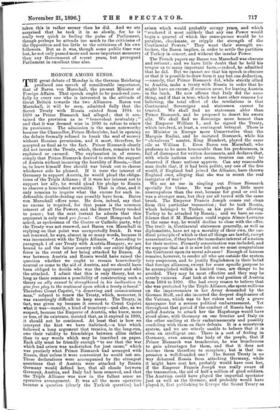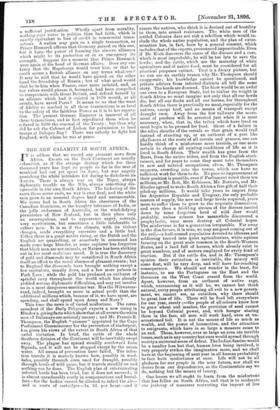HONOUR AMONG KINGS.
THE great debate of Monday in the German Reichstag produced one speech of considerable importance, that of Baron von Marschall, the present Minister of Foreign Affairs. That speech ought to be pondered care- fully by every one who is interested in the attitude of Great Britain towards the two Alliances. Baron von Marschall, it will be seen, admitted fully that the Secret Treaty with Russia existed from 1884 to 1890 as Prince Bismarck bad alleged ; that it con- tained the provision as to " benevolent neutrality ; " and that it was deemed wise in 1890 to refuse to renew its provisions. The admission is the more noteworthy because the Chancellor, Prince Hohenlohe, bad in opening the debate formally refused to break the seal of secrecy without Russian permission, and it must, therefore, be accepted as final as to the fact. Prince Bismarck clearly did not invent the Treaty, which, therefore, remains to be explained or excused. The explanatiod is, of course, simply that Prince Bismarck desired to retain the support of Austria without incurring the hostility of Russia,—that is, to leave himself free should war break out to choose whichever side he pleased. If it were the interest of Germany to support Austria, he would plead the obliga- tions of the Triple Alliance ; if it were her interest not to support her ally, he would plead his pledge to Russia to observe a benevolent neutrality. That is clear, and it only remains to inquire what the excuse for such in- defensible double-dealing can possibly have been. Baron von Marschall offers none. He does, indeed, say that no excuse is required, for that peace is the common interest of all the Powers, and the Secret Treaty tended to peace ; but the next instant he admits that this argument is only used pro forma. Count Hompesch had asked, as spokesman of the Centre or Catholic party, why the Treaty was not renewed, and Baron von Marschall in replying on that point was unexpectedly frank. It was not renewed, he says, almost in so many words, because it was inconsistent with the Triple Alliance. "According to paragraph 1 of our Treaty with Austria-Hungary, we are bound to aid the latter country with our entire fighting force in the event of her being attacked by Russia. A war between Austria and Russia would have raised the question whether we ought to remain benevolently neutral or come to the aid of Austria, and we should have been obliged to decide who was the aggressor and who the attacked. I admit that this is only theory, but so long as there remains a possibility of constructing such a theory an ally cannot be strengthened in his inclination to give free play to the sentiment upon which a treaty is based." Therefore Count Caprivi, "a deserving and conscientious man," refused to renew the Treaty, which, moreover, it was exceedingly difficult to keep secret. The Treaty, in fact, was given up because it seemed to Count Caprivi what it was—namely, a kind of treachery—and also, as we suspect, because the Emperor of Austria, who knew, more or less, of its existence, insisted that, as it expired in 1890, it should not be continued. At least that is how we interpret the hint we have italicised,—a hint which followed a long argument that treaties, in the long-run, owe their validity to friendships between allies rather than to any words which may be inscribed on paper. Each ally must be friendly enough " to see that the war which had arisen was undertaken for just cause," which was precisely what Prince Bismarck had arranged with Russia, that unless it were convenient he would not see. These declarations were accompanied by the strongest assertions that if Austria were attacked by Russia Germany would defend her, that all clouds between Germany, Austria, and Italy had been removed, and that the Triple Alliance was now in the fullest sense an operative arrangement. It was all the more operative because a question (clearly the Turkish question) had arisen which would probably occupy years, and which "rendered it most unlikely that any one Power would begin a quarrel of which the consequence would be to paralyse, checkmate, or cripple the strength of the Continental Powers." They want their strength un- broken, the Baron implies, in order to settle the partition of Turkey in concert, and without the insular Power.
The French papers say Baron von Marschall was obscure and reticent ; and we have little doubt that he held his tongue as to many important facts,—indeed, he admitted that he did. But we cannot see that his speech is obscure or that it is possible to draw from it any but one deduction, —namely, that Prince Bismarck did, while strictly allied to Austria, make a treaty with Russia in order that he might have an excuse, if occasion arose, for leaving Austria in the lurch. He now affirms that Italy did the same thing, and if that is true, which we have other reasons for believing, the total effect of the revelations is that Continental Sovereigns and statesmen cannot be trusted. We shall find no statesman abler than Prince Bismarck, and he proposed to desert his sworn ally. We shall find no Sovereign more honest than the Emperor William I., and he signed the Treaty, which involved, at least, a contingent betrayal. There is no Minister in Europe more Conservative than the Marquis Rudini, and he imitated Bismarck, while his " chivalrous " master, King Humbert, played the same role as William I. Even Baron von Marschall, who professes to be more honourable than his predecessors, is full of disrespect for written documents, and declares that, with whole nations under arms, treaties can only be observed if those nations approve. Can any reasonable man doubt that, if it had been politic, any one of the five would, if England had joined the Alliance, have thrown England over, alleging that she was in secret the real instigator of war ?
We see no use in singling out Prince Bismarck specially for blame. He was perhaps a little more unscrupulous than the rest, because for good or evil he was a stronger man, but they are all tarred with the same brush. The Emperor Francis Joseph comes out clean from this particular transaction ; but he took Bosnia, which belonged to Turkey, as his price for allowing Turkey to be attacked by Russia ; and we have no con- fidence that if M. Hanotaux could regain Alsace-Lorraine- in the same way, he would decline to close with the offer. The truth is, Continental statesmen generally, as well as diplomatists, have set up a morality of their own, the car- dinal principle of which is that all things are lawful, except assassination, if they have the immediate interest of a nation for their motive. Formerly assassination was included, and we suppose that as it is now left out we must congratulate the Continent upon its moral advance ! Enough of laxness remains, however, to render all who are outside the system very suspicious, and to justify Englishmen in their belief that foreign alliances, except for some specific purpose to be accomplished within a limited time, are things to be avoided. They may be most effective and they may be- utterly ruinous. Just look at the real position of Austria from 1884 to 1890. She had every reason to believe that she was protected by the Triple Alliance, she spent millions on the improvements in her Army demanded by the German Staff, and she incurred the deepest displeasure of the Vatican, which was to her rulers not only a grave annoyance but a serious political embarrassment. Yet throughout that period if the conduct of Russia had com- pelled Austria to attack her the Hapsburgs would have stood alone, with Germany on one frontier and Italy on the other smiling at their embarrassments and possibly condoling with them on their defeats. It is a monstrous system, and we are utterly unable to believe that it is even an intelligent one. There is a sort of feeling in Germany, even among the body of the people, that if Prince Bismarck was treacherous, he was treacherous to gain advantages for them, and that it does not become them therefore to complain ; but is that im- pression a well-founded one ? The Secret Treaty in no way debarred Russia from attacking Germany, while it might have cost her, probably would have cost her, if the Emperor Francis Joseph was really aware of the transaction, the aid of half a million of good soldiers. The Austrian could have played the impartial spectator just as well as the German, and probably would have played it, first publishing to Europe the Secret Treaty as -a. sufficient justification. Wholly apart from morality, nothing pays worse in politics than bad faith, which is exactly equivalent to loss of credit in commercial trans- actions. A nation may gain on a single transaction, as Prince Bismarck affirms that Germany gained on this one, but it loses the power of forming the sincere alliances which might be its protection or in an emergency its strength. Suppose for a moment that Prince Bismarck were again at the head of German affairs. Does any one fancy that the Hapsburgs would trust him, or that he could secure a British alliance on any terms whatever ? It may be said that he would have gained on the other hand the friendship of Russia ; but of what good would that be to him when France, once more isolated, and, as her rulers would phrase it, betrayed, had been compelled to compromise with Great Britain, and defend herself by an alliance which had it existed in 1870 would, at all events, have saved Paris ? It seems to us that the want of fidelity so marked in all these transactions is as fatal to the safety of the faithless Power as it is to her reputa- tion. The present German Emperor is innocent of all these transactions, and in fact repudiated them when he refused in 1890 the renewal of the Treaty ; but then why did he ask the Cabinet of Lisbon for permission to land troops at Delagoa Bay ? There was nobody to fight but England, with whom he was at peace.























































 Previous page
Previous page